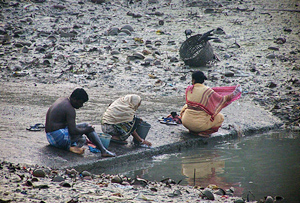New Delhi, Sep 03: The Narendra Modi government's ambitious poll promise to depollute River Ganga came under severe scrutiny on Wednesday in the Supreme Court which said it seems that steps taken so far will not lead to cleaning of the country's holiest river even after 200 years.
The apex court directed the Centre to come out in three weeks with a "stage-wise plan" to clean the river for "restoring it to its pristine glory".
"After seeing your action plan, it seems Ganga will not be cleaned even after 200 years. Evaluate the dream project You have to take steps to restore Ganga to its pristine glory.
"The dream project is there. Please try that the next generation is able to see the river in its original form. We don't know whether we will see it or not," a bench comprising justices TS Thakur and R Banumathi observed.
It said the "bureaucratic" approach in the action plan would not help in accomplishing Prime Minister's dream project of cleaning the river Ganga and asked the government to come out with "power point presentation" instead of giving vision plan and "artistic view".
The bench said it was not concerned about the financial assistance coming from other countries but was worried how the common people be explained about the proposal for proceeding with project of cleaning the 2,500-km long river stretch.
"We don't want to get into the nitty-gritty of committees etc. But common man expects to know how the cleaning Ganga process will emerge. They should at least know how the government is proceeding.
"You have given a very bureaucratic kind of explanation. We want to see it in a layman's language as to how you are proceeding with the project," the bench told solicitor general Ranjit Kumar after perusing the affidavit filed by Uma Bharti's ministry of water resources, river development and Ganga rejuvenation.
The bench, which asked the solicitor general to file a supplementary affidavit, said power point presentation would help in understanding the stage-wise action plan.
It specifically asked the government to apprise about the steps taken in ecologically sensitive areas from Gangotri to downstream 135km of the river as "no follow up steps have been taken up" after the 2003 notification.
The bench, which posted the matter for hearing on September 24, said in the present affidavit the government has only given the broad parameter on the issue and without the stage-wise plan it would be difficult to clean the river.
It noted in its order that the solicitor general was ready to file supplementary affidavit in which government would give in detail the steps likely to be taken by it in stage-wise manner for cleaning the river.
"We expect government to set out stages for execution of the project," the bench said. During the hearing it also made its intention clear that the apex court would not hesitate in assisting the governement by legal process if industrial units don't comply with laws.
The government has said it is committed to its pre-poll promise of making the river which passes through 29 major cities, 23 small cities and 48 towns, free from pollution.
In its affidavit, the Centre said, "it accords a status of national priority to the rejuvenation of river Ganga and the basic framework to achieve this national priority consists of evolving suitable strategies and action points in several thrust areas."
It said maintaining ecological flow in the river, abatement and mitigation of various types of pollution in it, restoring ecological sanctity, creating awareness about the conservation of river and ensuring people's participation in this process are some of the thrust areas.
"The achievements of these objectives entail multi-institutional, multi-dimensional and multi-sectoral approach," the affidavit said, adding to achieve this, consultative process, involving various ministries concerned has commenced to arrive at common strategy and action plan."
A group of secretaries has been tasked to go into issues connected with realisation of the objectives. Their report is presently under examination.





Comments
Add new comment